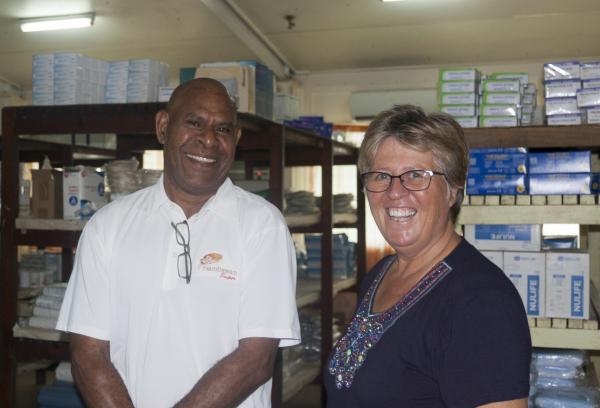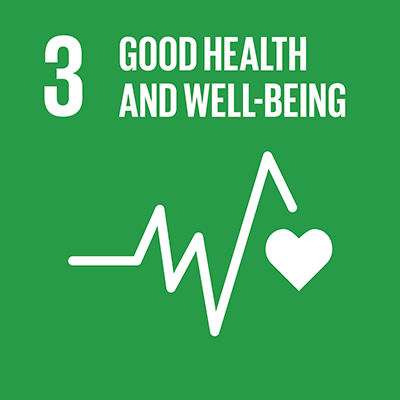10.05.2018 - Mary-Ann Hardcastle volunteered as a Nurse Trainer in Papua New Guinea in the 1990s. She and her husband have returned, this time to Bougainville, where they’ve been inspired by Bougainvilleans striving for positive change.
Women and education are two essential elements in rebuilding the Autonomous Region of Bougainville (ARoB). They are key to rebuilding family structures and economic stability that were painfully destroyed during the civil war in the 1990s, a period referred to as the “Crisis”. My husband, John (accompanying partner) and I (Health Services Management Adviser, Department of Health) are based at Arawa Health Centre (AHC), and have been here two months. Walking around Arawa is both interesting and confusing, as buildings appear to be abandoned, graffitied and neglected, destroyed during the Crisis. Yet, these buildings are peoples’ homes, their livelihoods and their future.

Mary-Ann Hardcastle (right) and Hari the Arawa Health Centre. Photo Credit: Samantha Morris
Women establish small temporary market stalls, selling whatever they are capable of making and growing to earn. I wonder what motivates them to turn up each day, often walking many kilometres. One day I hear the women on the topic of school fees and I ask how much they have to pay, and why they have to pay, as I had heard on the radio that school was free. “No gat.” (It is not).
In 2012, the Papua New Guinea Government committed to providing free education for all children, but some families still have to pay fees from preschool up to grades 10-12, and more again for vocational training. This places a massive demand on families that are barely living above the poverty line, yet make the commitment to send their children, or at least some of them, to school.
Juniata and Jocobite work until 8.00pm in a local second-hand clothes store, and shop not far from where we reside. As pre-Crisis children, they had the benefit of a comprehensive education but today have limited employment opportunities. Juniata’s take on the subject was very strong and clear; “We mothers are born to work for our children for the betterment of our future, the country’s future”. John and I share a moment of admiration for these
women and their determination for the betterment of their
children and country.
In fact, since we have been here, not a day goes by that I am not emotionally moved by the plight of the people who, as Nancy says, “struggle on a daily basis”. Nancy, an operating theatre nurse, works in an area that is currently a male domain. She works quietly in the background preparing instruments, washing, cleaning and ordering supplies from a limited store at the Health Centre. She is almost invisible to her male colleagues, yet as I have come to know her I see her as the backbone of the unit.
There are educational opportunities for women in Arawa but not knowing where to go and who to ask can be a barrier. There are a few staff at AHC who have been sponsored by NGOs and government departments to study. However, women must also be supported by their families in order to be “released from domestic duties”, as a community health worker puts it, and have a supportive partner that understands travelling is not about taking a holiday, but part of work and professional development. Gender violence remains an issue for women in ARoB. A 2015 Autonomous Bougainville Government and UN survey found that while many men and women did not support the use of violence and beatings by men against their wives and partners, three in four women had experienced such violence, and 85 percent of men and 75 percent of women felt that women should obey their husband.
Nancy has a supportive family that enabled her to undertake postgraduate studies, as she explains: “Family, family. If a woman does not have a supportive family and husband, then it is very difficult to succeed. I am blessed, I have a good family and we all help one another. Since the Crisis many families have become fragmented, old ways gone, and new ways of living and thinking that are harmful to our young people”. She adds, “It is very hard, very hard, and young men just seem to be interested in young girls so there are many distractions”.
There are many wanwoks (colleagues) who I admire, including Elizabeth, a former student I taught while a VSA nurse tutor at St. Mary’s Hospital, Vunapope, East New Britain, in 1991-1993. On first meeting she looked at me in disbelief; clearly the years had not been so kind to me, as she innocently claimed, “Oh, but you were so beautiful then”. I smiled as I reconnected with my cheeky ex-student, who always had a smile and a joke. Elizabeth had not changed. I asked how things had been for her over the last 25 years. Her posture was uneasy as her eyes shamefully look down and she mumbled; “It’s been hard”.
I soon learn that Elizabeth trained to be a midwife but on returning to her home in ARoB, she was unable to practice during the Crisis as all the medical services were destroyed. Elizabeth provided what care she could under very difficult circumstances, but over the years she became deregistered and deskilled which is why she was now working at AHC unpaid to regain her registration.
Elizabeth is often the sole midwife on shift for both the postnatal ward (10 beds) and birth suite. Sometimes, due to no diesel in the town, we are all in darkness. The hospital generator is only activated for “emergencies” which does not include normal childbirth! As I lie in my bed tossing and turning in the heat of the night, Elizabeth is attending births, the carers holding onto a pen torch, and all unpaid, month after month.
So what have we learnt? When I walk around the Health Centre and see the paucity of resources available to provide even basic care, I see women and staff who are dedicated, persistent and strong. They are the educators, as I learn lessons everyday. We learn that it is the blood and bones of Arawa that makes it such a great place, not the bricks and mortar.
The Arawa Health Centre. Photo Credit: Mary-Ann Hard-castle


